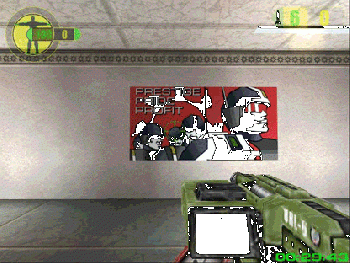Geo-Mod: Difference between revisions
No edit summary |
No edit summary |
||
| (One intermediate revision by the same user not shown) | |||
| Line 1: | Line 1: | ||
'''Geo-Mod''' is the name given to | {{Under construction}} | ||
{{SameName|single|the engine that powers the first two Red Faction games|the engine that powers Red Faction: Guerrilla and Red Faction: Armageddon|[[Geo-Mod 2.0]]}} | |||
'''Geo-Mod''' is the name given to the game engine created by [[Volition]] for [[Red Faction]]. The focus of its development was squarely on supporting extensive destruction capabilities beyond what was possible in other contemporary engines. | |||
==Geo-Mod== | ==Geo-Mod== | ||
| Line 25: | Line 27: | ||
*Skeletal animation supporting deformation and interpolation | *Skeletal animation supporting deformation and interpolation | ||
*Lightmap-based lighting system, supporting shadows and dynamic lighting | *Lightmap-based lighting system, supporting shadows and dynamic lighting | ||
[[Category:Red Faction]] | [[Category:Red Faction]] | ||
[[Category:Red Faction II]] | [[Category:Red Faction II]] | ||
Latest revision as of 00:21, 4 August 2024
 |
This page is under construction. The information on this page may not yet be complete. |

This article is about the engine that powers the first two Red Faction games. For the engine that powers Red Faction: Guerrilla and Red Faction: Armageddon, see Geo-Mod 2.0.
Geo-Mod is the name given to the game engine created by Volition for Red Faction. The focus of its development was squarely on supporting extensive destruction capabilities beyond what was possible in other contemporary engines.
Geo-Mod

Overview
The Geo-Mod engine, first featured in Red Faction, allows players to interact with and alter the game environment in real-time - a feature that was particularly revolutionary at the time of its introduction. This technology enables the destruction of structures, terrain, and other in-game objects in a realistic manner, significantly enhancing the immersion and strategic elements of gameplay. Geo-Mod allows players to use weapons to break through walls, floors, and other barriers, creating new pathways and tactical advantages.
After Red Faction's 2001 release, the Geo-Mod engine received some notable upgrades and went on to power 2002's Red Faction II.
The design tool used for developing environments in the Geo-Mod engine is RED.
History
The earliest known development work performed on what would eventually become the first Geo-Mod engine happened in 1998, while Volition was creating a 6-DOF space shooter title that was intended to be eventually released as Descent 4. Following the breakdown of Volition's relationship with Interplay in late 1999, Volition reused much of the tools and code that had been developed for Descent 4 (including an early incarnation of the engine that would eventually be called Geo-Mod) and began substantive work on Red Faction.
Geo-Mod, as the engine powering Red Faction, was first unveiled to the public by THQ at E3 2000.
Development
Volition started development of the engine with the end goal of "full, real-time destruction" in mind, initially unsure how to go about accomplishing that (or even, whether it was possible).
Key Features
- Realtime geometry destruction using CSG operations
- Advanced physics simulation, including support for falling geometry, particles, liquid, and force modifiers
- Land, water, and air vehicles
- Extensive AI capabilities and behaviour settings
- Skeletal animation supporting deformation and interpolation
- Lightmap-based lighting system, supporting shadows and dynamic lighting